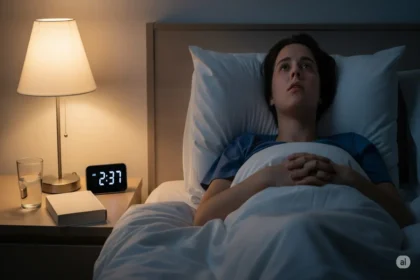Sleep Deprivation is a state most of us experience occasionally, a fleeting discomfort after a late night or an early start. But what happens when that discomfort is stretched to its absolute limits, when the human mind and body are pushed to the brink of collapse in the name of scientific inquiry? Throughout history, a handful of daring, and sometimes ethically questionable, experiments have sought to answer this very question, probing the profound and often terrifying consequences of sustained wakefulness. These “longest sleep deprivation experiments” offer a chilling glimpse into the fundamental necessity of sleep, revealing just how quickly our intricate biological systems begin to unravel without it.
From the early 20th century, as the nascent field of sleep science began to take shape, researchers were driven by a profound curiosity: what exactly does sleep do? And what are the consequences of its absence? Early studies were often rudimentary, sometimes even self-imposed, but they laid the groundwork for understanding sleep’s critical role in maintaining our physical and mental integrity. The narratives of these extreme experiments are not just scientific records; they are human stories of endurance, hallucination, and the undeniable power of our most basic biological need.
The Record Breaker: Randy Gardner’s 11 Days
Perhaps the most famous, and certainly the most well-documented, voluntary sleep deprivation experiment involved a 17-year-old high school student named Randy Gardner. In 1964, for a science fair project, Gardner set out to break the world record for staying awake. Under the supervision of Stanford sleep researcher Dr. William Dement and a fellow student, Bruce McAllister, Gardner managed to stay awake for an astonishing 264 hours, or 11 days and 25 minutes.
His journey into extreme wakefulness was meticulously observed. Initially, Gardner experienced typical symptoms: irritability, difficulty concentrating, and blurred vision. By day three, his mood swings were pronounced, and he struggled with basic tasks. He began to experience hallucinations, initially believing a street sign was a person, and later imagining he was a famous football player. His speech became slurred, his memory faltered, and his paranoia increased. He struggled to perform simple cognitive tests, often forgetting what he was doing mid-sentence.
What surprised researchers was Gardner’s relatively quick recovery. After his 11-day ordeal, he slept for a little over 14 hours on his first night, then about 10.5 hours the second night, and then returned to his normal sleep schedule. While he didn’t “make up” all the lost sleep, his brain prioritized the most restorative stages, particularly NREM (Non-Rapid Eye Movement) deep sleep and REM (Rapid Eye Movement) sleep, which saw a significant rebound. Gardner’s case provided invaluable, albeit anecdotal, evidence that humans could endure extreme sleep deprivation without immediate, catastrophic long-term effects, though the acute effects were severe. It also highlighted the brain’s remarkable capacity to recover lost sleep, prioritizing the most vital stages.
The Fictional Horror: The Russian Sleep Experiment
No discussion of extreme sleep deprivation is complete without mentioning “The Russian Sleep Experiment.” This chilling creepypasta, a viral internet horror story, describes a supposed Soviet-era experiment where five political prisoners were kept awake for 15 days using an experimental gas. The story details their descent into madness, self-mutilation, and ultimately, death.
While compelling and terrifying, it is crucial to state that The Russian Sleep Experiment is a work of fiction. There is no scientific evidence, historical record, or credible source to support its existence. It serves as a powerful cautionary tale, however, reflecting humanity’s deep-seated anxieties about the unknown consequences of extreme sleep deprivation and the ethical boundaries of scientific research. It underscores the public’s intuitive understanding that pushing sleep limits too far can lead to horrific outcomes, even if the specific details of the story are fabricated.
Animal Studies: The Ultimate Price of Wakefulness
While direct, lethal sleep deprivation experiments on humans are ethically unfeasible and illegal, animal studies have provided stark evidence of sleep’s absolute necessity for survival. The most famous of these were conducted by Dr. Allan Rechtschaffen and his colleagues at the University of Chicago in the 1980s.
In these groundbreaking, albeit controversial, experiments, rats were subjected to total sleep deprivation. They were placed on a small platform over water, which would rotate whenever the rats showed signs of falling asleep, forcing them to move to avoid falling into the water. The results were dramatic and unequivocal: the rats died within 2-3 weeks, a timeframe comparable to death from starvation.
Before dying, the rats exhibited a range of severe physiological symptoms:
These studies powerfully demonstrated that sleep is not merely for rest but is fundamental for maintaining basic physiological processes, including metabolism, thermoregulation, and immune function. While direct extrapolation to humans must be done cautiously due to species differences, these experiments unequivocally established sleep as a life-sustaining biological imperative for mammals.
Ethical Shifts in Sleep Research
The history of sleep deprivation experiments reflects a significant evolution in scientific ethics. Early studies, like Gardner’s, were often driven by curiosity and lacked the stringent ethical oversight prevalent today. The risks, though not fully understood, were undertaken by participants who often volunteered.
Today, research involving sleep deprivation is conducted under strict ethical guidelines. Total sleep deprivation for extended periods is generally not permitted in human studies due to the known risks to physical and mental health. Instead, researchers typically employ methods of partial sleep deprivation (e.g., restricting sleep to 4-5 hours per night) or sleep fragmentation (disrupting sleep without preventing it entirely) over shorter durations. These studies are designed to minimize harm while still providing valuable insights into the effects of chronic insufficient sleep on cognitive performance, mood, and physiological markers. Participants are closely monitored, and studies are often terminated if adverse effects become too pronounced.
This shift underscores a critical understanding: while the human body can endure remarkable periods of wakefulness, the cost is substantial and the long-term consequences can be severe. Modern sleep science focuses on understanding these consequences to inform public health recommendations, rather than pushing individuals to their breaking point.
The Real-World Consequences: Beyond the Lab
While controlled experiments provide valuable data, the most widespread and concerning “sleep deprivation experiment” is happening in the real world every day. Millions of people routinely shortchange their sleep, driven by demanding jobs, social pressures, technological distractions, and a pervasive undervaluation of rest. The consequences, though often subtle at first, accumulate into a silent epidemic of chronic health issues.
These are the insidious, long-term “deaths” by a thousand cuts, where chronic sleep deprivation erodes health and vitality, significantly shortening lifespan and diminishing quality of life.
Conclusion: The Indispensable Pillar of Life
The history of sleep deprivation experiments, from the voluntary endurance of Randy Gardner to the tragic outcomes in animal studies, paints a clear and undeniable picture: sleep is not a luxury, but a fundamental biological imperative for survival and thriving. While a healthy human body might not immediately cease to function after a few days without sleep, the cascading physiological and psychological breakdowns that occur are profound and ultimately life-threatening.
Modern science has moved beyond simply observing the immediate effects of extreme wakefulness. It now meticulously dissects the molecular and cellular mechanisms by which sleep repairs, restores, and protects every system in our body. The lessons from these past experiments, coupled with contemporary research, reinforce a crucial message: prioritizing consistent, quality sleep is one of the most powerful and accessible investments we can make in our long-term health, cognitive function, and emotional well-being. The true danger of sleep deprivation isn’t just the acute fatigue or the occasional hallucination; it’s the silent, relentless erosion of our very capacity to live a full, healthy, and vibrant life.
Disclaimer: The information provided in this article is for general informational purposes only and does not constitute medical advice. It is not a substitute for professional medical advice, diagnosis, or treatment. Always seek the advice of your physician or other qualified health provider with any questions you may have regarding a medical condition. Never disregard professional medical advice or delay in seeking it because of something you have read on this website.














